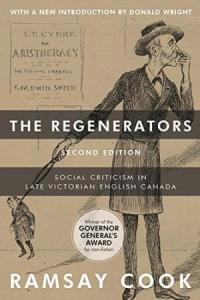By Don Wright

In Montreal’s Place des Arts to accept the 1985 Governor General’s Literary Award for Non-Fiction, Ramsay Cook said that he was honoured to be recognized alongside poets, playwrights, and novelists, “which is where a historian should be.” Indeed, it was one of his firmest convictions that history was also an art and that historians had an obligation to write well: “Unscientific as it may sound, language and style are part of the very essence of the historian’s craft.” After reading the first draft of an article I had written about him, he gave me two pieces of advice from his days as a cub reporter on the sports beat in the late 1940s: avoid jargon and don’t use a five dollar word when a five cent word will do the trick.
From his inauspicious start at the Morden Times, he became a prolific writer, a brilliant essayist, and a tough but fair critic with a distinctive and recognizable style marked by clarity, generosity, erudition, and the careful use of the epigraph. He also became a respected public intellectual, someone who could draw on the past to deepen our understanding of the present. Continue reading






 Remember
Remember 